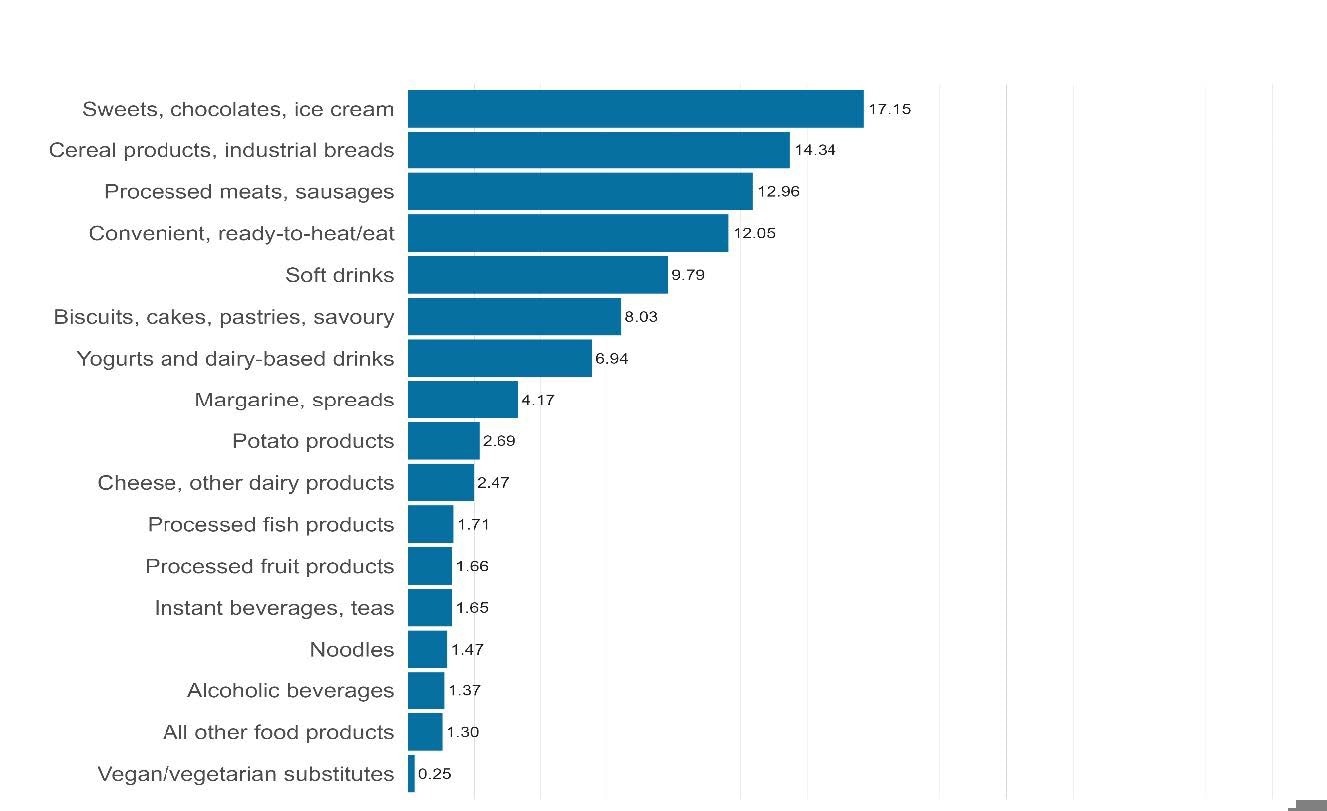
Ultra-Processed Foods are Silently Altering Your Metabolism, Scientists Warn
Dr. Sanchari Sinha Dutta, Ph.D. via News-Medical – Study identifies metabolic changes caused by ultra-processed foods, raising concerns about their role in obesity, cardiovascular disease, and gut health disruption.
Study: Association of ultra-processed foods intake with untargeted metabolomics profiles in adolescents and young adults in the DONALD cohort study.
Scientists in France and Germany have conducted a study to identify urine and plasma metabolic biomarkers associated with ultra-processed food intake in adolescents and young adults.
The study is currently available as a pre-proof in The Journal of Nutrition.
Background
Ultra-processed foods refer to industrially processed food products containing food-derived or reconstituted ingredients and other industrially isolated components. These components are typically used to increase the shelf-life and sensory properties of the products.
The intake of ultra-processed foods is increasing exponentially worldwide, especially in developed countries. Epidemiological studies have consistently linked high intake of ultra-processed foods, particularly animal-based food products and sweetened beverages, to increased risks of obesity, cardiovascular disease, and metabolic disorders. Excessive intake of ultra-processed foods is also associated with chronic kidney disease, cancer, and neuropsychiatric complications.
Ultra-processed foods contain excessive amounts of added sugars, salts, saturated fats, energy-dense components, and lower amounts of proteins and dietary fibers. Such poor nutrient profiles are believed to be responsible for negative health consequences.
In this study, scientists have determined the associations between ultra-processed food intake both plasma and urine metabolite levels in adolescents and young adults. They applied untargeted metabolomics analysis to capture a wide array of metabolic changes linked to ultra-processed food intake.
-
Over 40 metabolites linked to ultra-processed food consumption were identified, with key markers like indoxyl glucuronide signaling potential metabolic disruptions.
The scientists selected these two biological matrices because short-term changes in metabolite levels related to dietary intake are more reliably reflected in urine samples, and plasma samples provide a more stable overview of long-term diet-responsive metabolic states.
Study design
The scientists analyzed data from the Dortmund Nutritional and Anthropometric Longitudinally Designed (DONALD) study, an ongoing study designed to regularly assess and follow healthy infants until adulthood.
The DONALD study has been recruiting healthy infants annually since 1985 and regularly assesses their dietary intake, anthropometric measurements, urine sample collection, blood sample collection, medical parameters, lifestyle factors, and other sociodemographic data.
Data from adolescents who provided 3-day dietary records and 24-hour urine samples was analyzed to determine the association between ultra-processed food intake and urinary metabolic profile.
For young adults, the association between ultra-processed food intake and blood metabolic profile was determined by analyzing 3 or more 3-day dietary records within the 5-year period preceding a single blood measurement.
Important observations
A total of 339 adolescent urine samples and 195 young adult blood samples were analyzed in this study. There was an overlap of 139 participants between the two groups.
The proportions of ultra-processed food intake relative to total food intake in adolescents and young adults were 22% and 23%, respectively. The most commonly consumed ultra-processed foods in both groups were sweetened beverages and ready-to-heat or ready-to-eat food products.
Sweets, chocolates, ice cream, cereals, industrial breads, and processed meats and sausages contributed the most to energy intake.

-
Mean energy contributions of various foods groups to the total UPF energy intake (%) in (A) Adolescent urine.
Impact of ultra-processed food intake on urinary metabolic profile
A total of 42 ultra-processed food-responsive metabolites were identified in adolescent urine samples. Of these metabolites, 21 showed positive associations with ultra-processed food intake.
Among known metabolites identified in urine samples, ultra-processed food intake showed a significant positive association with indoxyl glucuronide and other partially characterized glucuronides. These glucuronides are involved in detoxification processes, notably the elimination of dietary substances through glucuronidation pathways.
Impact of ultra-processed food intake on plasma metabolic profile
A total of six ultra-processed food-responsive metabolites were identified in young adult plasma samples. Of these metabolites, 4-hydroxyglutamate and two structurally unknown metabolites showed positive associations with ultra-processed food intake. 4-hydroxyglutamate has previously been linked to metabolic syndrome and may be an indicator of metabolic stress.
Impact of ultra-processed food intake on urine and plasma metabolite patterns
A total of 25 metabolite patterns, identified using robust sparse principal component analysis (PCA), explained 61.7% of the variance in ultra-processed food-mediated metabolic changes in adolescent urine samples. A significant positive association of ultra-processed food intake was observed with one urinary metabolite pattern (‘xenobiotics and amino acids’) and one plasma metabolite pattern (‘lipids, xenobiotics, and amino acids’).
Both metabolite patterns shared 29 metabolites that were primarily associated with xenobiotic metabolism, which involves the breakdown and elimination of foreign substances like food additives.
Study significance
The study finds that ultra-processed foods can induce changes in urine and plasma metabolite levels in adolescents and young adults through various pathways, including xenobiotic metabolism, amino acid metabolism, and lipid pathways.
The study identifies indoxyl glucuronide and other partially characterized glucuronides as major urinary metabolites positively associated with ultra-processed food intake. Glucuronides are produced during glucuronidation, a key biological detoxification pathway.
Regarding diet-related glucuronidation, evidence suggests that gut microbiome plays a key role in modulating microbial transformation of dietary substrates and glucuronide levels and biosynthesis of microbial metabolites.
It is also well-established in the literature that ultra-processed foods can induce gut microbiota dysbiosis, which in turn is associated with a range of health adversities, including immunological and neuropsychological disorders.
Overall, the study findings provide useful information on the complex biological mechanisms through which ultra-processed foods may affect metabolism and health. The findings also raise concerns about how the displacement of minimally processed foods by ultra-processed options can lead to both nutritional deficiencies and disruptions in gut health.
Journal reference:
Muli S. 2024. Association of ultra-processed foods intake with untargeted metabolomics profiles in adolescents and young adults in the DONALD cohort study.
The Journal of Nutrition. https://www.sciencedirect.com/science/article/pii/S002231662401040X
To read the original article click here.






